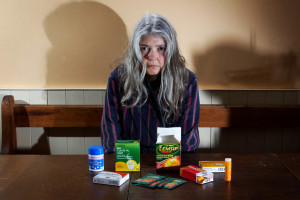With legislators focused on reducing access to reproductive health, it is far too easy for them to overlook a slew of other important — and disturbing — health trends for women in North Carolina.
North Carolina earned a D+ in a recent report on the status of women’s health and well-being from the >>Institute for Women’s Policy Research. The researchers looked at nine indicators ranging from mental health to exercise habits to deaths from heart disease and cancer.
The news for American women is not good, and the news for North Carolina is worse.
One bright spot is that deaths from heart disease, lung cancer, and breast cancer are going down, and North Carolina is in the middle of the pack on these indicators. But other than that, things are looking grim.
- We are among the 10 worst states for diabetes among women. 1 out of every 10 women has diabetes, and it is much higher if you look just at African American and Native American women. Across the country there is an alarming rise in diabetes among women: an increase of 49% since 2001.
- The sexually transmitted infection chlamydia has seen a huge increase across the country in the last 10 years. This is probably due, at least in part, to better buy zithromax online testing and reporting. Here too, we are among the worst 10 states in the country. 6 out of every 1000 women in NC have been diagnosed with the infection, which has almost no symptoms and can lead to pelvic inflammatory disease and even infertility if not treated.
- Women in our state report emotional problems — including stress and depression — more than 4 days a month. Along with the 5 days a month that women’s activities are limited because of illness and disability, this is almost a third of every month when we are not at our peak!
- And then there is weight and obesity: a growing concern for all Americans. More than 60% of North Carolina women are overweight or obese (>>BMI of 25 or greater). Almost ¾ of African American women are overweight or obese. How are we helping these women thrive?
- Genetics and lifestyle play a part, and compared with the rest of the country, North Carolina women are less likely to exercise or eat fruits and vegetables. Fewer than half of the women in our state report they get the recommended >>150 minutes of exercise every week and only about 1 in 10 women eat >>5 servings of fruits and vegetables a day.
We cannot overlook the impact that public policy has on all this. Health status is shaped by poverty, access to affordable health care, housing quality, safety, access to healthy food, racism and discrimination. Health disparities for women, people of color, LGBT people, and the elderly are stark.
Almost 20% of NC women do not have health insurance – due at least in part to the legislature’s failure to accept federal funds to expand Medicaid. Women in NC earn just 83 cents to every dollar a man earns and almost a third of women work in low wage jobs. The result is that 30% more women than men in our state live in poverty.
Until we have full access to health insurance and are economic security, these health disparities will continue – no matter how many fruits and vegetables we eat.
>> Janet Colm is the founder and former CEO of Planned Parenthood of Central North Carolina. She was arrested as part of the Moral Monday protests in July 2013 and lives in Chatham County, NC.
Janet Colm is the founder and former CEO of Planned Parenthood of Central North Carolina. She was arrested as part of the Moral Monday protests in July 2013 and lives in Chatham County, NC.

There are no comments
Add yours